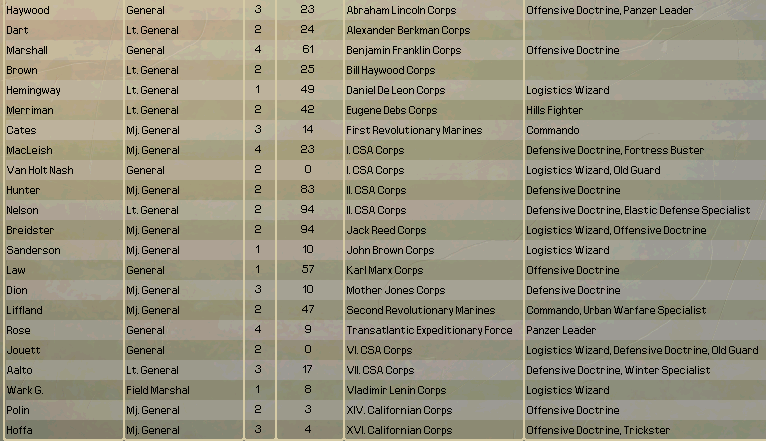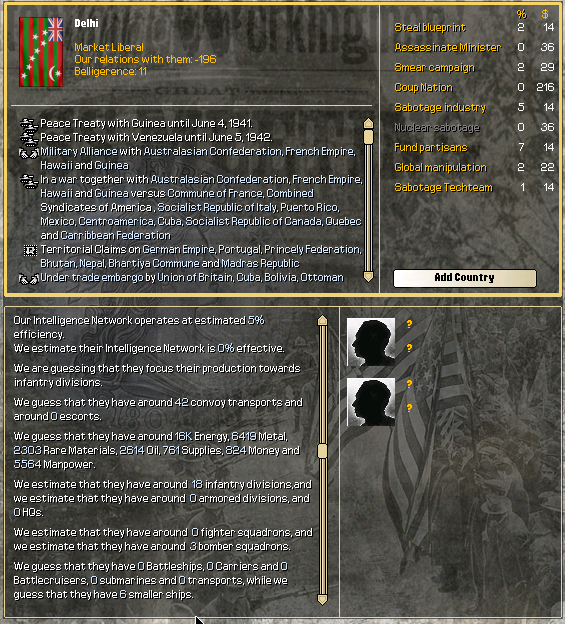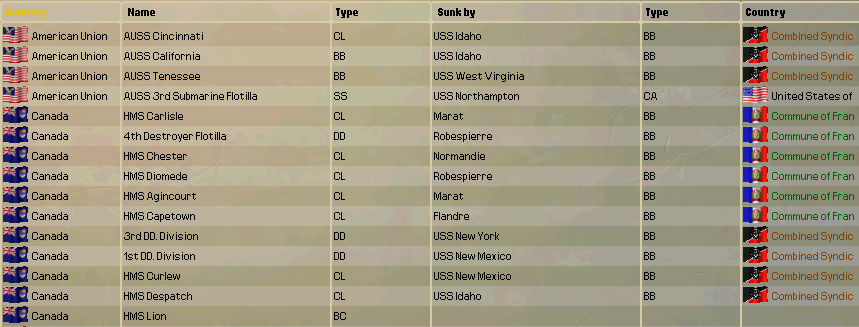|
Chief Savage Man posted:Bolivia is alone in a sea of reactionaries, everybody else is some flavor of right wing. I know Kaiserreich is supposed to be some kind of half-serious everyone-has-different-politics alternate universe, but how does that happen?
|
|
|
|

|
| # ? Apr 19, 2024 21:18 |
|
Lustful Man Hugs posted:I know Kaiserreich is supposed to be some kind of half-serious everyone-has-different-politics alternate universe, but how does that happen? Well I know that Bolivia, Brazil and Venezuela have a shot of revolution but the RNG only hit for Bolivia this time. Brazil got the Integralists (fascists) and La Plata is typically conservative. Some games there can be quite the continental war between Syndicalists and conservatives but it was not to be this time.
|
|
|
|
Brazil also goes syndicalist fairly often. Usually at least two other South American states go syndicalist and they form an alliance, but which ones are fairly random. Only Argentina and Chile can't, as far as I can remember. But sometimes you get the rare option like in this game and only one goes that route.
|
|
|
|
Jaramin posted:"Rome was't the world's greatest pre-modern empire! See, we had literally everything they had (we were even so kind to stop at Hadrian's Wall), plus all of Asia
|
|
|
|
A Buttery Pastry posted:I don't think Rome even cracks the top 10 of greatest pre-modern empires, judging by either size or population. what about by size of post-fall fanbase? That catches everyone from Charles the Great to Edward Gibbon to fictional but archetypical Paradox Forums poster BasileusAdolphus88
|
|
|
|
Reveilled posted:what about by size of post-fall fanbase? That catches everyone from Charles the Great to Edward Gibbon to fictional but archetypical Paradox Forums poster BasileusAdolphus88
|
|
|
|
A Buttery Pastry posted:I don't think Rome even cracks the top 10 of greatest pre-modern empires, judging by either size or population. rome was in a corner of the world whose scrubby little history has become disproportionately relevant in the last few centuries, but in terms of raw human biomass and everything that flows from it there really wasn't much going on outside asia until like 1500
|
|
|
|
oystertoadfish posted:rome was in a corner of the world whose scrubby little history has become disproportionately relevant in the last few centuries, but in terms of raw human biomass and everything that flows from it there really wasn't much going on outside asia until like 1500 Rome ruled between a fifth and quarter of all living people at its height, that's not entirely unimpressive.
|
|
|
|
Yeah, that's a fairly stupid metric to judge a state by. Cultures aren't remembered for the sheer number of people they ruled, but rather than the cultural and sociological novelties they left behind that persisted to the nations that followed them. Roman poo poo pervades western society so fully they you can't spit without running into one of their legal principles, descendant languages, alphabet, calender, etc. I'd argued their sole equal in that respect is Han China who essentially left behind a long-lasting legacy in the East like Rome did in the West.
|
|
|
|
Jaramin posted:Yeah, that's a fairly stupid metric to judge a state by. Cultures aren't remembered for the sheer number of people they ruled, but rather than the cultural and sociological novelties they left behind that persisted to the nations that followed them. Roman poo poo pervades western society so fully they you can't spit without running into one of their legal principles, descendant languages, alphabet, calender, etc. I'd argued their sole equal in that respect is Han China who essentially left behind a long-lasting legacy in the East like Rome did in the West. Even then, Han Chinese legal/lingo/alpha/cala is a much bigger deal for as many if not more people, and on top of that you've got the Sanskrit thing going on. (Also stop using 'the East' and 'the West' it's giving me hives.)
|
|
|
|
oh my god what is even the point behind this cultural dickwaving edit: hey guys newsflash all cultures are important, insisting that some are 'more or less' important just encourages lovely scholarship and historiography. Agean90 fucked around with this message at 01:14 on Apr 1, 2015 |
|
|
|
Jaramin posted:Yeah, that's a fairly stupid metric to judge a state by. Cultures aren't remembered for the sheer number of people they ruled, but rather than the cultural and sociological novelties they left behind that persisted to the nations that followed them. Roman poo poo pervades western society so fully they you can't spit without running into one of their legal principles, descendant languages, alphabet, calender, etc. I'd argued their sole equal in that respect is Han China who essentially left behind a long-lasting legacy in the East like Rome did in the West. That's not really what is important though. The fascinating part of the Roman Empire is that it allowed for the flow of goods and knowledge between far-away lands, establishing trade routes of distances otherwise were unheard of at the time. Pottery shards have been uncovered in England that originate from North Africa, circa 200 AD. I'd almost argue that, with the decentralized nature of the Roman provinces, the Empire provided less of a firm governing authority in many of its lands and more of a framework for proto-globalization.
|
|
|
|
i will say that i may have been exaggerating. not quite as much as gibbon tho i've read the dude, i kind of envy him, but he's a man of his time. he wrote the best footnotes ever though, none have surpassed him
|
|
|
|
As references to the Roman Empire increase, the need for me to post an update also increases.
|
|
|
|
Chief Savage Man posted:As references to the Roman Empire increase, the need for me to post an update also increases. 
|
|
|
|
Chief Savage Man posted:As references to the Roman Empire increase, the need for me to post an update also increases. And when you hint at an update, something else increases.
|
|
|
|
Chief Savage Man posted:As references to the Roman Empire increase, the need for me to post an update also increases. Gallia est omnes divisi in partes tres...
|
|
|
|
Okay, not being a poo poo, I'll hopefully get to it tonight. March has been a bitch and I don't want to put out stuff I don't personally enjoy reading so if there's delays, that's not me losing interest at all. If I don't get to it, I fully expect this thread to be about Byzantium by tomorrow morning.
|
|
|
|
You should be able to reform Byzantium in Kaiserreich because it was the best, most influential and long lasting culture ever, surpassing any other empire you could possibly name, and the spirit of it was surely still fresh in the mind of greeks in 1940
|
|
|
|
Redczar posted:You should be able to reform Greater Serbia, Fourth Rome in Kaiserreich because it was the best, most influential and long lasting culture ever, surpassing any other empire you could possibly name, and the spirit of it was surely still fresh in the mind of greeks in 1940
|
|
|
|
I tried to play that Greek nationalist mod from several pages ago and it crashes when I open the technology screen  I just want the Greek Orthodox Danubian Federation.
|
|
|
|
I think that mod requires a rather old version of DH as well as KR. I think.
|
|
|
Chief Savage Man posted:I think that mod requires a rather old version of DH as well as KR. I think. Actually, as far as I can tell, it works for the version of DH and KR you're running - i.E. the last one before the recent update.
|
|
|
|
|
Jaramin posted:Yeah, that's a fairly stupid metric to judge a state by. Cultures aren't remembered for the sheer number of people they ruled, but rather than the cultural and sociological novelties they left behind that persisted to the nations that followed them. Roman poo poo pervades western society so fully they you can't spit without running into one of their legal principles, descendant languages, alphabet, calender, etc. I'd argued their sole equal in that respect is Han China who essentially left behind a long-lasting legacy in the East like Rome did in the West.
|
|
|
|
Let me tell you about the 5000 continuous years of Chinese civilization.
|
|
|
|
Redczar posted:You should be able to reform Byzantium in Kaiserreich because it was the best, most influential and long lasting culture ever, surpassing any other empire you could possibly name, and the spirit of it was surely still fresh in the mind of greeks in 1940 I think it's technically possible for you to reintroduce the Megali Idea and reestablish the Byzantine Empire as Greece, but it's not something that will ever actually happen unless a player is specifically angling for it and is probably in there mostly as a joke decision. You can do the same thing in vanilla Victoria II, as well.
|
|
|
|
I think we can all agree that Trajan was, in fact, the Best Emperor.
|
|
|
|
paragon1 posted:I think we can all agree that Trajan was, in fact, the Best Emperor.
|
|
|
|
Sorry I should have clarified Best Roman Emperor.
|
|
|
|
paragon1 posted:Sorry I should have clarified Best Roman Emperor. Suleiman the Magnificent.
|
|
|
|
Freudian posted:Suleiman the Magnificent. I can back this up, people still pray at his tomb in Istanbul to this day. The man has a following.
|
|
|
|
paragon1 posted:Sorry I should have clarified Best Roman Emperor. Roman Abramovich. His trusty consul Jose Mourinho has laid the foundations for an unshakeable empire of wealth and prowess that it would take a revolution to shift.
|
|
|
|
Caesar Augustus is best
|
|
|
|
Freudian posted:Suleiman the Magnificent. Did the Ottoman's claim to be inheriting Rome's legacy? I didn't think they did.
|
|
|
|
paragon1 posted:Did the Ottoman's claim to be inheriting Rome's legacy? I didn't think they did. Mehmed II took the title of Kayser-i-Rūm, so he certainly thought he inherited their legacy.
|
|
|
|
The problem, I feel, is that most Posters on SA are Westerners and don't really care about Chinese impact on East Asia/India. If you're gonna compare sheer geographical size and population, China throughout its various iterations wins almost every time, but if you're gonna compare cultural impact, I'd say that its a toss-up between the Chinese, the Romans, and the Mongols. The impact of the Chinese is so pervasive that Korea, Japan, Vietnam, Cambodia, still have writing systems largely based on Chinese Caligraphy, and the fact that many places in Southeast Asia and Indonesia are home to generations of Overseas Chinese who's progenitors arrived there thousands of years ago. The impact of the Chinese culture is incredibly pervasive in Southeast Asia, and the only reason it isn't stronger in more parts of the world is the fact that there's a big fukken desert on the Western side of China and big fukken mountain range on the Southwestern Side. Jaramin posted:Yeah, that's a fairly stupid metric to judge a state by. Cultures aren't remembered for the sheer number of people they ruled, but rather than the cultural and sociological novelties they left behind that persisted to the nations that followed them. Roman poo poo pervades western society so fully they you can't spit without running into one of their legal principles, descendant languages, alphabet, calender, etc. I'd argued their sole equal in that respect is Han China who essentially left behind a long-lasting legacy in the East like Rome did in the West. ^^this sums up Romans influence quite well. Western cultures, and even to sum extent, Middle Eastern cultures draw upon Roman influence dramatically. And finally, the Mongols wrecked everybodies poo poo. They absolutely decimated the Middle East,China, India, Southeast Asia, Europe (Russia and Hungary in particular), and pretty much anywhere their horses could set foot. Most places where the Mongols showed up either barely recovered or never did. The Mongol sack of Baghdad in the 12th century was so devastating that the city remained uninhabited for almost a century post-sack, and it never recovered to its former glory.
|
|
|
|
GSD posted:Mehmed II took the title of Kayser-i-Rūm, so he certainly thought he inherited their legacy. It's really hard to say. To make him the inheritor of Rome's legacy, he would have to adopt Rome's institutions to some extent. Did he? Or is successors? At that point, Rome was an ecclesiastically-endorsed semi-dynastic dictatorship, but not monarchy. Mehmed II most definitely intended to rule as a monarch, and the structure of the Ottoman Empire seems like it was strictly monarchical. That said, some of its power struggles seem fairly Roman (there's nothing the Romans excelled at more than power struggles), although rather than assassinating and overthrowing their leaders, the Ottomans would generally assassinate one and trot out someone else from the dynasty. Of course, this distinction may simply have been a result of the fact that the Ottoman sultans often had lots of heirs and the Romans often had very few. Maybe there wasn't really an institutional difference.
|
|
|
|
Dibujante posted:It's really hard to say. To make him the inheritor of Rome's legacy, he would have to adopt Rome's institutions to some extent. Did he? Or is successors? At that point, Rome was an ecclesiastically-endorsed semi-dynastic dictatorship, but not monarchy. Mehmed II most definitely intended to rule as a monarch, and the structure of the Ottoman Empire seems like it was strictly monarchical. That said, some of its power struggles seem fairly Roman (there's nothing the Romans excelled at more than power struggles), although rather than assassinating and overthrowing their leaders, the Ottomans would generally assassinate one and trot out someone else from the dynasty. He inherited the only parts that mattered: the fancy city and the fancy titles.
|
|
|
|
Dibujante posted:It's really hard to say. To make him the inheritor of Rome's legacy, he would have to adopt Rome's institutions to some extent. Did he? Or is successors? At that point, Rome was an ecclesiastically-endorsed semi-dynastic dictatorship, but not monarchy. Mehmed II most definitely intended to rule as a monarch, and the structure of the Ottoman Empire seems like it was strictly monarchical. That said, some of its power struggles seem fairly Roman (there's nothing the Romans excelled at more than power struggles), although rather than assassinating and overthrowing their leaders, the Ottomans would generally assassinate one and trot out someone else from the dynasty. As an aside, what is the difference between an "ecclesiastically-endorsed semi-dynastic dictatorship" and a monarchy? The name of the titles? It's not like monarchies don't come in many different forms.
|
|
|
|

|
| # ? Apr 19, 2024 21:18 |
|
Chapter Eighteen: The Islands (October 1940-April 1941) Joseph John Connor Midterm Exam HIST 215 Short Essay #2 Topic: C - Free Press in Wartime America Using the provided sources and what you've learned, comment on the status of the free press in 1940s America and how it changed in different circumstances. The Chamber of Deputies officially affirmed the rights to free press and speech provided in the First Amendment of the United States Constitution in 1937, but like the United States before it, the Combined Syndicates often restricted that right when they felt it was in the national interest to do so. The central government's ability to restrict press differed based on its level of control in a given area. Regions with established union government had almost unchecked freedom of the press, while it was restricted in regions where the transition from a capitalist to socialist economy was ongoing.  The first source is an editorial published in Atlanta, the former capital of the Union State and a hotbed of anti-syndicalist sentiment. It was written, likely by a central government functionary, in the days following the Venezuelan declaration of war against the enemy Caribbean Federation.  The same paper had published news the same day about the move of the Caribbean leadership to Bermuda. The newspapers in the South were often controlled by the regional representatives of the central government, and thus the editorials were often merely government commentary on the news presented elsewhere in the paper.  This particular editorial advocated military operation against Bermuda and the rest of the Federation, something was of course in the works already.    The anti-Entente tone of the editorial is intense, and it calls repeatedly for retribution for the American lives lost in the just ended Great North American War.   As was common in non-syndicalized regions, the tone was less about expanding the revolution and more nationalistic. Rather than liberating the workers of the Caribbean, a tone you might expect in a New York newspaper, this editorial claimed it was necessary in order to 'establish American dominance' and 'protect the South from foreign attack'.    The editorial makes no comment on what would happen to the Caribbean Federation after said military operation. One can only assume that advocacy of the type of multiracial government that would eventually be established in the Caribbean would inflame white opinion in the South.  The editorial also took a government stance in its anti-Venezuelan attitude. As we learned, the French government took an interest in safeguarding the possessions of the social democrat Dutch government. The American government was willing to turn a blind eye to Dutch colonialism in order to help the French keep the Dutch out of the German alliance. The mention of the need to 'protect the Dutch islands' betrays the government's hand in writing this particular editorial, because it seems unlikely that the average citizen of Georgia would be particularly concerned about Dutch colonies.  This is in contrast to the second source, an editorial about Hawaii published in Seattle. This editorial was clearly not written by a government advocate, because it openly criticizes the manner in which the government was dealing with Hawaii.  There was a state of war between the island republic and the Combined Syndicates, by virtue of its defensive pact with the defunct Pacific States. Thus, if the writer believed the Combined Syndicates should not incorporate Hawaii, s/he did not say so in the editorial. To do so could have opened up the writer to a number of charges or to be marked as a counterrevolutionary.  Even though Seattle had only recently been incorporated into the Combined Syndicates, the city had a long history of IWW activity, including a massive general strike in 1919. This meant that the city's syndicalization process took less time than in the South, and therefore the central government tolerated a greater degree of free press.   The writer did not oppose the idea of military action in the Pacific, noting the Australasian activity and the importance of Palmyra Atoll as a forward naval base.    They repeatedly expressed their support for the sailors and the navy.   Where the writer begins to disagree with the military action is concerning action against Hawaii itself. The writers disparages the bombing campaign that took place against Honolulu in 1940, calling it counterproductive and cruel, instead advocating covert action aimed at inspiring an indigenous revolution, rather than building support for the Entente by bombing civilians. The editorial is indicative of Seattle's situation as a city in the midst of socialist transition, where the regional authorities felt confident enough in their position to allow some criticism of the government's methods but not confident enough to allow any editorials that openly challenged the aims of the governments.   Ultimately, the American military did withdraw from the region, the Hawaiian defenses too strong for the still young Revolutionary Marines. Perhaps the editorial was allowed because the government was not wholly committed to the operation to begin with, but that is merely speculation. The third and final source comes from an anarchist newspaper distributed in Detroit. The very fact that an anarchist newspaper existed speaks to how well established socialist government was in the city. The level of press freedom allowed in Detroit was not a function of what the government was comfortable dealing with, but rather something that the government was forced to deal with, because the alternative was provoking strike action, rioting or insurrection by the large and entrenched anarchist or trade unionist movements within the city.  This particular opinion piece concerns the Canadian Trade Union Congress of 1940. The piece blasts apart the central planning strategy adopted by Tim Buck's Totalist faction, calling it 'totalitarian and unbelievably dangerous'.   Furthermore, it goes after the aggressive military buildup of the Canadian republic, something championed in public by Benjamin Gitlow. The writer lambasts the American Central Committee for making a 'deal with the devil', the devil in question being Tim Buck. Other statements like 'putting foreign adventures before the well being of North Americans' and calling Gitlow a 'coward' makes it clear that the government had no hand in penning or approving this article.   The article also comments on the St. Lawrence Accord, which allowed the French significant influence in Quebec. While the writer does not take nearly as much issue as he does with the CTUC, he does claim it as another evidence of Gitlow's supposed cowardice. These sources indicate that freedom of press in wartime America was closely linked to concern about reactionary elements. In areas where reactionary sentiment was strong, the press was closely watched. In areas where they were weak, the press was given considerable leeway. And in areas where there was almost no concern about reactionary factions, the press was given almost total freedom to criticize the government, so long as the criticism was coming from a generally left political standpoint. _____________________________ END OF ACT TWO State of the World, April 1941  The tide of the Balkan war is beginning to turn against the Bulgarians once more, with the Serbs pressing back from the brink.  War has broken out between the Integralist (far right) government of Brazil and the conservative government of La Plata.  The Indian war between the Bhartiya Commune and the Princely Federation is progressing slowly, with the edge going to the Commune.  The Qing are well on their way to defeating the Mad Baron.  The CNT-FAI have been defeated, and the front line has generally remained static, stretching from Leon to Catalonia.  Our air force has absorbed the Pacific one and grown somewhat larger.  The army has also gotten larger between the absorption of the Pacific army and some peacetime construction. The focus from now on will be on motorized infantry, which is much more mobile than foot infantry.  Our navy still consists of what we inherited from the US and AUS. Carrier and heavy cruiser production is underway but will take a few years until we're ready to field a new modern fleet. Therefore, it'll be important to be careful with what we have already.  Our most skilled generals are Rose and Marshall, though Haywood is not far behind.  America is fully united, and we are the industrial giant you would expect us to be.   We're up there with the deadliest in the world, having completely destroyed a number of militaries. Especially with our new focus on encirclement, we'll be wiping out whole divisions more often, which should increase our "body count" (including captured).  We've done very well in preserving our manpower (not that we need to). Overwhelming force, picking our battles and air support have done a lot to minimize our casualties so far.     The AI is rather bad at coordinating with its allies, which is good for us, because the Entente could put together a sizable force that could effectively defend one of its members, but by themselves, we'll be able to handle any of them. Australia appears to have inherited some of the Canadian navy, so they are really a naval power we ought to be careful in dealing with, lest we lose more of our limited amount of BBs like we did around Palmyra.     Last but not least, I always enjoy looking at the sunk ships list, just to see if any particular ship did well. I believe that the USS New Mexico has the most kills with 10, but one of those kills is our own ship from when the New Mexico was in federal service so I don't know if it counts. This is where the French have been of particular help, with their sizable fleet on the prowl for the enemy while I've generally tried to avoid large battles so far.
|
|
|
































